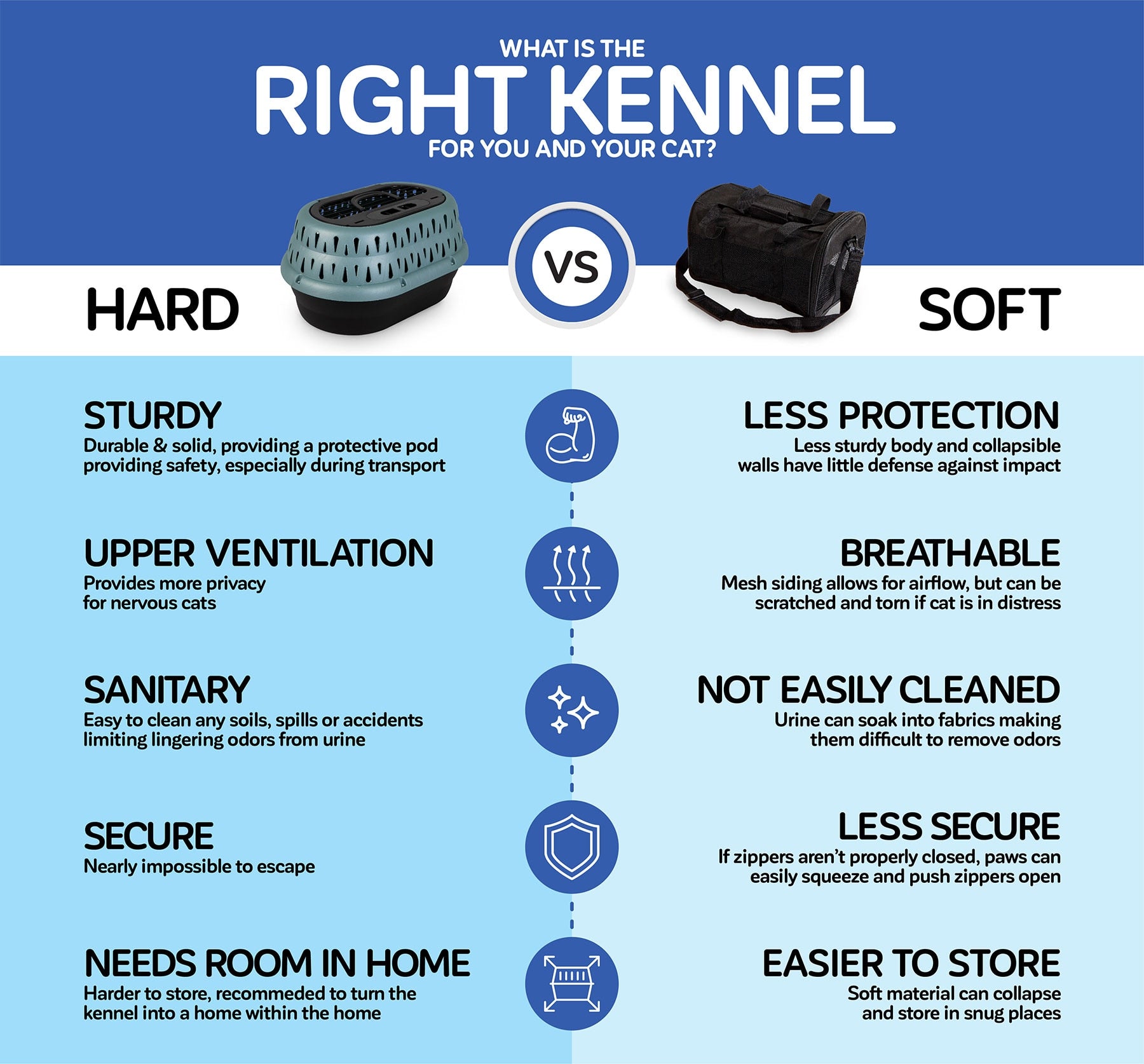Hard Vs. Soft Cat Carriers: Which is Right For You?

If you're looking for the perfect cat carrier, you have a lot of things you'll need to take into consideration such as size, style, and features. One of the first things to decide, though, is whether a hard carrier or soft carrier will better suit your, and your cat's needs.
Remember, cat carriers are necessary even for those who may not travel with their cat very often. Chances are, you will take your cat to the vet at some point, and you will need something to keep your cat contained. Letting your pet wander around the car while it's moving can be dangerous. Your vet may even require that you transport your cat in a carrier of some kind.

What are the Main Differences Between Hard & Soft-Sided Cat Carriers?

Hard Carriers
Hard carriers, also known as kennels, are constructed with plastic and are often recommended for car travel rather than air travel. Below are a few pros and cons of hard cat carriers:
Pros:
- First, hard carriers are much easier to clean than soft carriers. If your kitty makes a mess or has an accident, all you need to do is wipe down the inside with a wet cloth. In addition, your cat likely won't do much damage to the interior of the carrier with its claws.
- Hard carriers are sturdier than soft carriers. Because they're heavy-duty, they won't tip over or get damaged quite as easily as soft carriers might. Plus, if anything falls on it, your cat likely won't be injured.
- Last of all, hard carriers tend to also be more secure. Most hard carriers have a metal or plastic door, which is nearly impossible for your cat to open and sneak out of.
Cons:
- One con of hard carriers is that they are bulky and not as easy to carry around with you as a soft carrier might be.
- Because they're bulky, hard carriers are also harder to store or stow. Keep this in mind if you are planning on bringing your cat on a plane with you. Not all hard carriers will fit easily under an airplane seat. You will need to check with your airline to see if they have any restrictions or regulations when it comes to types of pet carriers, as well as to confirm any other requirements they might have for bringing pets onboard.
- Finally, hard carriers can be uncomfortable for your cat. They don't come with any kind of padding, so this is something you will have to add separately via carrier accessories.
Soft Carriers
As the name implies, soft carriers are made with softer materials such as nylon and mesh. Below are a few pros and cons of soft-sided cat carriers.
Pros:
- Unlike hard shell options, soft carriers are lightweight. This is especially helpful if you will be carrying your cat around a lot, such as through an airport.
- Soft-sided carriers are more comfortable for your cat. They are designed with plenty of padding, which allows your kitty to have a nice space to lay down, nap, and feel at ease. Plush, many soft-sided cat carriers are designed with breathable materials which lets in fresh air.
- The flexible material makes soft-sided carriers much easier to store than hard carriers. If you plan on carrying your cat onto a plane with you, a soft-sided carrier is going to be your best choice.
Cons:
- Because soft carriers are made with fabric, your cat can easily damage the material inside with its teeth or claws.
- Softer materials provide less protection. If anything bumps or falls on your cat's carrier, they have a greater risk of being injured.
- Lastly, soft-sided carriers are more difficult to clean. While it's easy to simply wipe down a hard carrier, soft carriers may need to be run through the washing machine if your cat has an accident or leaves some kind of mess behind. Bad smells may also stick around longer in a soft carrier since they can soak deep into the fabric if not cleaned regularly.
Which Carrier is Right For Me?

There is not a one-size-fits-all answer as to what carrier is best overall. You will need to assess your and your cat's needs to figure out what will work best for your situation. Ask yourself some of these questions before you begin your search.
-
How often will you be traveling with your cat?
Do you plan on taking them with you on trips fairly often? Or is this carrier going to be primarily used for visits to the vet once or twice per year? -
Do you plan on ever flying with your cat?
Even if you don't have a trip planned right at this moment, do you know that you will want or need to fly with your cat in the future? -
What is your cat's personality like?
Is your cat easily anxious? Does he or she try to escape when in an enclosed space?
If you're still unsure with which route to go, here are some of our recommendations:
Hard carriers are best for….
- Cats who often attempt to escape
- Cats who are messier or more destructive
- Cats who are anxious about traveling or leaving the house
- Owners who want something safer and sturdier
- Owners who have plenty of storage space
Soft carriers are best for….
- Cats who do not tend to have accidents or make messes
- Cats who are calm about traveling or leaving the house
- Airplane travel
- Owners (and cats) who prefer something more comfortable
- Owners who have limited storage space
Hopefully, this has been a helpful guide when it comes to choosing the perfect carrier for you and your cat. Whether you're venturing somewhere near or far, we hope you have safe and smooth travels!
Previous article

Next article

Related posts
View all-

How to Keep Your Pet Calm During Thanksgiving
Thanksgiving is a time for family, friends, and food, but for our pets, the holiday can be overwhelming. The sudden change in routine, unfamiliar faces and scents, and increased noise can trigger significant stress. Understanding why your pet might feel anxious is the first step toward creating a peaceful holiday experience for everyone, including your furry family members. This guide offers calming tips for pets and practical solutions to ensure your dog or cat feels safe and secure during the festivities.
Read Article -

Top Travel Essentials for Pets This Holiday Season
Holiday travel often means bringing the whole family along, and for many of us, that includes our furry companions. Preparing for holiday pet travel is about more than just packing a bag; it's about ensuring your pet's safety, comfort, and happiness from the moment you leave home until you return. A little planning helps reduce stress for both you and your pet, making the journey a positive experience for everyone involved.
Read Article -

Best Leashes and Collars for Daily Walks: A Pet Parent’s Guide
A daily walk with your dog isn't just a chore—it's a chance to bond, explore, and stay active together. The right leash and collar can make every walk safer and more enjoyable for both of you. With numerous styles and materials available, it's essential to find gear that suits your dog's needs and your lifestyle.
Read Article



